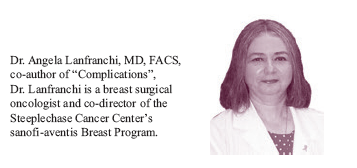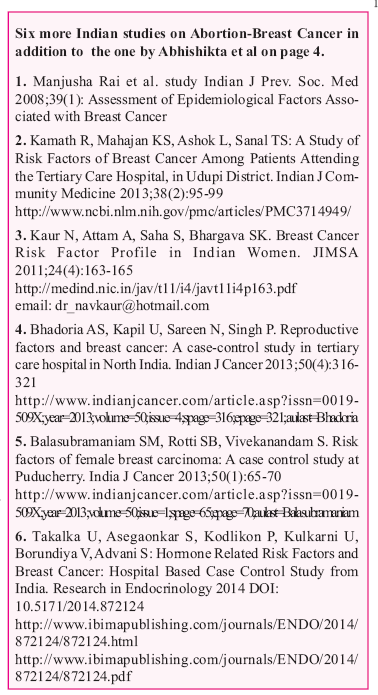Book Shelf - "Complications: Abortion's Impact on Women"
"Complications: Abortion's Impact on Women", by Angela
Lanfranchi, Ian Gentles & Elizabeth Ring-Cassidy.
The de Veber Institute for Bioethics and Social Research,
2013. 266 pp. www.deveber.org. Reviewed by Barry
Bostrum in Novo Libri, Issues in Law and Medicine
Spring 2014.
This book has been nearly ten years in the making. It arises out of a concern that the steadily growing body of information about the harmful complications of abortion for women and their subsequent children should become widely known. These complications are physical, psychological, social, and spiritual. In order to present direct evidence of the malaise brought on by abortion in contemporary society, the authors have included in their study the results of interviews of over 100 women who have undergone that experience.
All three authors are concerned about the ill effects - largely unknown, and for the most part unpublicized - of induced abortion on women. After several years of intensive research they are more than ever persuaded of the urgency of communicating this information to medical professionals, counselors, and to women who are contemplating having an abortion. What they have written is based on rigorous research: more than 650 papers, mostly in medical and psychological journals, as well as a number of books and official publications. Some of the findings are startling, and even counter intuitive. Some of them contradict the statements of official bodies that have been charged with the responsibility of providing accurate information to women.
The chapter on breast cancer, for example, provides solid documentation, both biological and epidemiological, that challenges the National Cancer Institute's official position on the link between induced abortion, and the subsequent risk of breast cancer. They also provide solid documentation, from several countries, that challenges the statement of the American Psychological Association that induced abortion has no adverse effects upon women.
In recent years informed consent has become an increasingly important issue in relation to abortion. In spite of the insistence of various official bodies that abortion has no negative consequences for women, several states have passed "right-to-know" laws, which have created difficulties for abortion providers who have failed to inform their clients of the risks surrounding abortion. In addition, U.S. courts have accepted the validity of the sworn testimony of thousands of women as to the negative impact abortion has had upon them.
As is increasingly clear, the physical consequences of surgical abortion are more widespread and serious than previously thought. The complication rate for chemically-induced abortions is much higher. The authors are convinced that the biological and epidemiological evidence for a link between induced abortion and the later development of breast cancer is so overwhelming as to be irrefutable. The readers are invited to review the evidence in Chapter 7 and judge for themselves.
Prenatal testing to detect genetic defects and anomalies in the fetus has become increasingly common. Unfortunately, the practice has not been accompanied by any increase in the support to parents, or to their children with genetic disorders. Still less is testing being used to prevent or treat illness and disability to help unborn children.
Concerning infertility, or subfecundity, there is limited but strong evidence that induced abortion is linked to an increase in both. Induced abortion also carries the risk of perforating the uterus and rendering the cervix incompetent. These complications may also result in infertility.
A recent paper in an influential American journal of obstetrics and gynecology has advanced the astonishing claim that abortion is safer for women than childbirth. This conclusion flies in the face of recent, massive studies in four countries showing that women who have abortions experience a much higher death rate than women who give birth.
Two recent systematic reviews have made it settled science that women who have one or more abortions significantly increase their risk of later giving birth to a preterm or low birth weight child. These children suffer from significantly higher rates of several disabilities, notably cerebral palsy, intellectual impairments and autism. The social cost of the increased rate of premature births due to abortion is immense.
 On the psychological and social fronts, abortion has been
found to have unfortunate consequences for the family. This
is the subject of Chapter 16. The debate also continues to
rage over abortion's impact on women's mental health. A
recent meta-analysis published in the British Journal of
Psychiatry concluded that women who had one or more
abortions suffered an 81 percent greater risk of mental health
problems than women who did not. The author and her conclusions
were subject to bitter criticism, but the editors upheld
the validity of the paper, and their decision to publish
it. Again, we invite readers to review the evidence in Chapter
17 and judge for themselves.
On the psychological and social fronts, abortion has been
found to have unfortunate consequences for the family. This
is the subject of Chapter 16. The debate also continues to
rage over abortion's impact on women's mental health. A
recent meta-analysis published in the British Journal of
Psychiatry concluded that women who had one or more
abortions suffered an 81 percent greater risk of mental health
problems than women who did not. The author and her conclusions
were subject to bitter criticism, but the editors upheld
the validity of the paper, and their decision to publish
it. Again, we invite readers to review the evidence in Chapter
17 and judge for themselves.
Another issue is not the subject of debate: the relationship between induced abortion and intimate partner violence. Studies from across the world establish a strong correlation between induced abortion and intimate partner violence. Plainly put, women who seek abortion are more likely to suffer physical abuse than those who do not. Why this should be so is the subject of Chapter 18.
It is evident that many women undergo induced abortion without experiencing any adverse consequences, physical or psychological. Yet there is disturbing evidence that the emotional impact of an abortion can lie dormant for decades, manifesting itself late in a woman's life. Chapter 20 contains a number of stories collected by palliative nurse Jean Echlin from women on their deathbeds who were haunted by abortions long past.
The authors end this book by listening to what women themselves have to tell us about their abortion experience. Their stories are riveting and full of surprises. A common theme among the stories told by 101 women to researchers from the de Veber Institute is regret at having the abortion and firm resolve never to have another. These stories, as well as many more from other sources, expose the illusion that abortion is a free choice and a liberating experience for women. In short, the narrative evidence from many women calls into question the oft repeated assertions by various "experts," that abortion has minimal psychological effect upon women.
The world wide practice of abortion has been attended by some unexpected and unfortunate consequences. In China, India, and other countries ultrasound imaging has been used for 40 years or more to detect the sex of the child before birth, and to discard those who are unwanted. In the overwhelming number of cases this has meant the elimination of female children and a consequently much higher ratio of males to females. The unusual gender imbalance affects society in many ways, including a rather significant shortage of marriageable females, and increase in sex crimes against women.
As this book demonstrates, the literature provides dramatic evidence that abortion is far from a panacea for women with inconvenient or problem pregnancies, and actually harms them in many ways, most of which are unacknowledged by women's organizations and public health services, and unknown to the women considering abortion.
